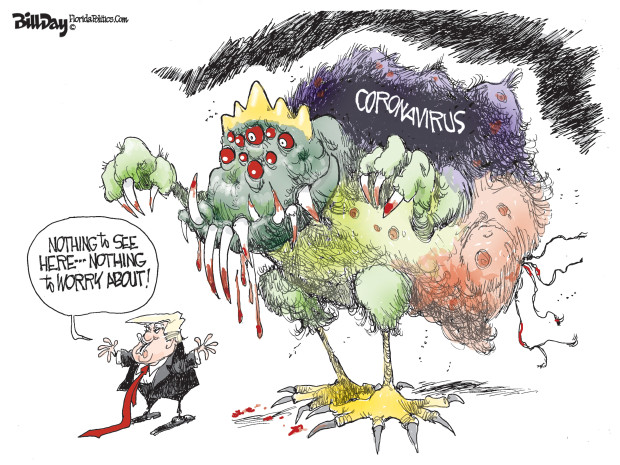What Will We Do About the Courts?
Today in Wisconsin, people are risking their lives to vote, and the U.S. Supreme Courtis okay with this.
Wisconsin Gov. Tony Evers attempted to postpone the state’s primary scheduled for Tuesday, issuing a last-minute executive order after failing to get the Republican-controlled state legislature to agree to a delay. Because the state had been deluged with absentee ballot requests — causing some voters not to get their ballots in time — a federal judge had ordered the state to accept ballots postmarked for an additional six days. Republicans sued to get that ruling overturned and to force the election to go on as scheduled.
This Vox article provides more background on the Wisconsin debacle. Back to Paul Waldman:
Why were they so eager to have the election in the middle of this pandemic? The key race was for a seat on the state supreme court, which will help them solidify their conservative majority, which is in turn vital to maintaining the system of minority rule in Wisconsin. That includes the extraordinary partisan gerrymander of state legislative districts engineered by Republicans, a gerrymander so brutally effective that in the 2018 state assembly elections, Democrats won 53 percent of the votes but Republicans won 63 of the 99 seats.
Republicans know their voters are more likely to have already voted absentee or live in less-populated areas where they can vote safely at a less-crowded polling place. Democrats, on the other hand, are being forced to literally risk their lives to vote. In Milwaukee, a city of 600,000 people, the number of polling places was reduced from 180 to five.
Late Monday, the state Supreme Court ruled that the governor did not have the authority to postpone the election. And then the U.S. Supreme Court overruled the previous decision that allowed six additional days for the absentee ballots. Only ballots postmarked by Tuesday can be counted. So right now people are standing in five-hour-long lines in the middle of a pandemic to try to vote.
Back to Paul Waldman:
This is a very ominous sign for what will happen in November. There will be battles across the country over how the upcoming election will be conducted — whether it will be fair, whether everyone will have access to the ballot and whether we’ll be able to trust the result.
And the Supreme Court will be there to put a thumb on the scales for the Republican Party.
On Monday, by a 5–4 vote, the U.S. Supreme Court approved one of the most brazen acts of voter suppression in modern history. The court will nullify the votes of citizens who mailed in their ballots late—not because they forgot, but because they did not receive ballots until after Election Day due to the coronavirus pandemic. As Justice Ruth Bader Ginsburg wrote in dissent, the court’s order “will result in massive disenfranchisement.” The conservative majority claimed that its decision would help protect “the integrity of the election process.” In reality, it calls into question the legitimacy of the election itself.
See also Leah Litman, The Supreme Court’s Wisconsin Decision Is a Terrible Sign for November, in Atlantic.
And this takes us to the larger question — thanks to Trump appointees, much of the federal judiciary has been larded with loyalist party hacks who are years away from retirement. Dealing with this is going to be a huge problem.
In other news:
CNBC:
President Donald Trump has removed the lead watchdog overseeing the $2 trillion coronavirus package, just days after the official, Glenn Fine, was appointed to the role.
The move came as Trump pursued similar action in recent weeks against independent inspectors general across the federal government.
Acting Navy Secretary Thomas Modly resigned on Tuesday, a day after leaked audio revealed he called the ousted commander of the USS Theodore Roosevelt “stupid” in an address to the ship’s crew, according to a US official and a former senior military official.
So, the news isn’t all bad.
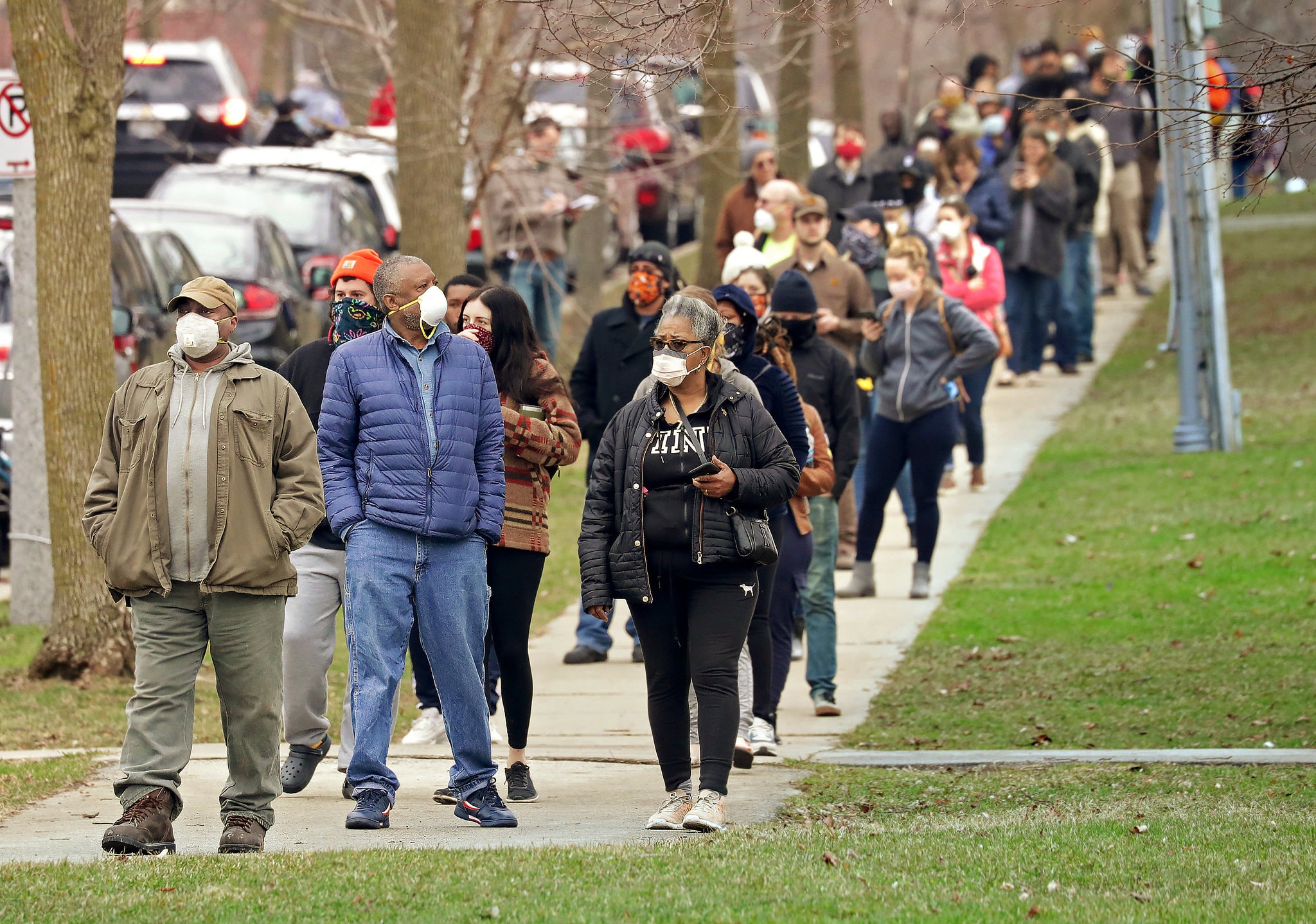
People lined up to vote outside Riverside High School in Milwaukee on Tuesday.Credit…Mike De Sisti/Milwaukee Journal Sentinel, via Reuters
The Hydroxychloroquine Flap
Hydroxychloroquine is a prescription drug used to tread lupus, rheumatoid arthritis, and malaria. Like a lot of presciption drugs it can cause nasty side effect, including possibly fatal heart damage and permanent vision loss. It is known to interact badly with some other drugs, such as insulin and other diabetes drugs; drugs that treat common heart problems; and antiseizure and immunosuppresant drugs. So it’s not something you should take without close medical supervision, and you should take it only if you really need it.
Hydroxychloroquine also is thought to have anti-viral properties, and there have been studies for using it to treat viral diseases going back 40 years, according to the Lancet. However,
Hydroxychloroquine has shown activity in vitro against many viruses, including influenza and coronaviruses, but that has largely failed to translate into success in either animals or humans. In 2005, the drug showed in vitro activity against SARS-CoV, which is closely related to the current pandemic virus, but it failed to decrease viral load in mice, and clinical interest drifted away, says Christopher Tignanelli, a surgeon at the University of Minnesota in Minneapolis, who is involved in clinical trials of COVID-19 treatments.
“There is not a huge amount of pre-clinical data for this drug,” says Tignanelli. “It’s mostly test-tube and anecdote.”
In other words, while it’s not impossible that hydroxychloroquine would be useful to treat our current coronavirus, that’s a long shot. Claims about patients it helped might just be a placebo effect. And given the drug’s risks, it’s not something to hand out to people indiscriminately in case it might help.
So when Donald Trump, who is hyping hydroxychloroquine, says “What do you have to lose? Take it,” the answer to his question is that you could lose your eyesight or your life. You could also lose your hair and develop ringing in the ears, nasty rashes, and suicidal thoughts.
But the degree to which elements in the Trump administration are pushing hydroxychloroquine as the magic bullet that will get us out of this pandemic mess suggests either desperation or avarice, or both. Suddenly there are shortages, which also suggests hoarding and a lot of the pills being diverted into a black market. It’s also the case that much of the hydroxychloroquine sold in the U.S. comes from India, which has stopped exports to the U.S.
A website called Sludge that may or may not be reliable claims that the Trump administration is being aggressivly lobbied to promote hydroxychloroquine by conservative groups with ties to the pharmaceutical industry. So there’s that.
CNN reported on a tense encounter among White House advisers over the weekend:
While discussing the latest on hydroxychloroquine this weekend, an exasperated Navarro lashed out at Dr. Anthony Fauci, one of the advisers who has urged caution about the drug, a person familiar with the meeting told CNN.
Navarro had brought a stack of paperwork with him into the Situation Room on the drug, arguing it was proof that it could work to treat coronavirus, which Fauci, the nation’s top infectious disease expert, disagreed with because it was not data.
“What are you talking about?” Fauci asked — a question that set Navarro off. He became indignant, and at one point, accused Fauci of opposing Trump’s travel restrictions on China, which confused many in the room, given Fauci was one of the initial few to agree with Trump on the move, the source said.
Navarro, allegedly an economist, was mostly known for advising Trump on trade policy before the pandemic turned him into a medical expert. Be afraid. But Trump himself is the biggest salesman for the drug. Back to CNN:
Without citing evidence, Trump said at Sunday’s briefing that hydroxychloroquine is a “great” and “powerful” anti-malaria drug “and there are signs that it works on this, some very strong signs.”
For people without heart problems, Trump recommended combining hydroxychloroquine with azithromycin, a common antibiotic. He said azithromycin “will kill certain things that you don’t want living within your body.”
Yet there is little reliable evidence that the drugs — either alone or in combination — are effective at treating the novel coronavirus.
Still, Trump said: “What do you have to lose? What do you have to lose?”
For doctors, nurses and first responders, Trump suggested the drugs could be taken as a preventative. “They say taking it before the fact is good, but what do you have to lose?”
Experts do not suggest taking hydroxychloroquine as a preventive for Covid-19 because there is no evidence yet to suggest it protects against contracting the virus.
“They say take it,” said Trump, without citing any experts or sources. “I’m not looking at it one way or the other, but we want to get out of this. If it does work, it would be a shame if we didn’t do it early. But we have some very good signs.”
Trump also said the US Food and Drug Administration gave hydroxychloroquine “rapid approval,” but in fact, the FDA has not approved it for the treatment of Covid-19.
Talk like this is going to ramp up black market sales, big time, and probably kill a lot of people.
Peter Wade writes in Rolling Stone,
What exactly Trump’s motives are to get behind the unproven coronavirus remedies remains to be seen. But between this weekend’s reported argument coming out of the White House, sending out Navarro to undermine Fauci’s advice on the topic is disturbing. Adding to that, Trump himself did not allow Dr. Fauci to comment on hydroxychloroquine when reporters asked about the administration’s insistence to promote the drug during a recent briefing and new reporting by the Washington Post tells of Rudy Giuliani’s involvement in the chloroquines game while attempting to “cast himself in a new role: as personal science adviser.” The whiff of a new grift is strong.
It might be that Trump just wants there to be an easy cure for the coronavirus in order to get the pandemic out of the way, and the stock market back up, before the November election. He seems susceptible to magical thinking, in particular the notion that if he says something often enough and forcefully enough reality will bend to his will. But it’s also the case that somebody must smell money to be made.
The president’s position is that he wants this to be true, and if he says it over and over and enough people believe him, it might as well be true. This strategy is not science, and goes against all the achievements of the human race that brought us out of the Dark Ages, but it’s what got him to the White House.
We elected a snake-oil salesman as President of the United States, and by God, he’s going to peddle some snake oil. How long, really, until we find out someone in Trump’s orbit stands to benefit financially from boosted sales of hydroxychloroquine? The most innocent explanation here is that Trump is merely a desperate and scared conman who is in way over his head. The least innocent is that he’s grifting on a global pandemic after completely botching the American response. …
… But now the whole right-wing grift-o-rama machine is oiled up and humming. The lackeys on State TV are peddling it in every segment they can, because he’s peddling it and their job is to peddle him.
So a lot of people are going to be taking lordy-knows-what sold to them as hydroxychloroquine, and maybe it’ll just be sugar pills that don’t do any harm, but it could give them a false sense of security leading to reckless behavior. Or, worse, it might really be hydroxychloroquine, and they could be hit with the dangerous side effects. If doctors want to try it as a last-ditch therapy on the sickest coronavirus patients that’s one thing, but you know it’s not going to stop with that.
In other news — Josh Marshall has been noting instances of our federal government seizing shipments of medical supplies heading to states or hospitals, and sometimes to other countries. See, for example, What’s Up with the Feds Seizing PPE Shipments to States and Hospitals?
Let’s talk about these seizures of PPE goods by federal authorities. There are a number of instances of this and as I noted in the post below a number of reasons why it might be happening. There are numerous cases where orders placed by states or hospitals have been canceled after they have been outbid by federal authorities or federal authorities have ordered vendors to sell to the federal government. According to Kaiser Health News, those compelled sales appear to be pursuant to an executive order President Trump signed on March 18th under authorities granted by the Defense Production Act.
But what I’m more interested in are reports of federal authorities confiscating physical shipments en route to states, local governments or regional hospital systems. The most publicized case of this came at some point in March when, according to Massachusetts Gov. Charlie Baker (R), a shipment of 3 million masks ordered through BJ’s Wholesale was seized by federal authorities in the Port of New York. Baker did not say which agency confiscated the goods or under what authority. That incident was what led to the widely reported and successful effort to fly goods in from China using the New England Patriots jet. …
… It’s not entirely clear from the report. But this does not sound like the federal government outbid the county or forced it to sell but rather that the physical shipment was interdicted and seized by federal authorities.
See also Barbados Claims US Seized Ventilators En Route to Country. Basically, it sounds like some part of the U.S. government is just flat-out seizing materials that had been lawfully purchased and were en route to the purchaser. WTF? Where are these supplies going? Who has them? Where are they going? Who is making money from this?
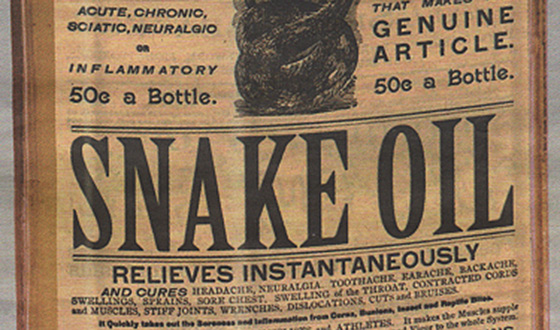
Are the Trumps Engaged in Profiteering?
According to the Kaiser Family Foundation, the Trump Administration is buying up a lot of the medical supplies being produced in the U.S. right now, but it’s not clear where these supplies are going.
The Trump administration quietly invoked the Defense Production Act to force medical suppliers in Texas and Colorado to sell to it first — ahead of states, hospitals or foreign countries.
It took this action more than a week before it announced Thursday that it would use the little-known aspect of the law to force 3M to fill its contract to the U.S. first. Firms face fines or jail time if they don’t comply.
The Cold War-era law gives federal officials the power to edge out the competition and force contractors to provide supplies to them before filling orders for other customers.
While it’s unclear how many times the power has been used during the coronavirus pandemic, federal contracting records examined by Kaiser Health News show that federal authorities staked first rights to $137 million in medical supplies. The orders in late March flew under the radar, even as dog-eat-dog bidding wars raged among states and nations for desperately needed medical protective gear.
“It’s like ‘Lord of the Flies’ out there for states and hospitals as they bid against each other for critical medical supplies and equipment,” Sen. Chris Murphy (D-Conn.) said in a statement to KHN. “Plus, there’s no transparency about what the federal government is doing with the equipment that they purchase when they outbid states and hospitals.”
The article continues to describe a chaotic situation in which orders are being cancelled because the federal government is claiming first dibs on production, but it’s not clear where all this material is going. FEMA appears to be involved, but exactly what FEMA is doing isn’t clear, either.
There could be a perfectly good explanation for the federal supplies-grab, but this is the Trump Administration we’re talking about, so that’s unlikely. And it’s probably Jared Kushner we’re talking about, since he has inserted himself into this mess and has established a headquarters at FEMA. Kushner’s pronouncement that the federal stockpile of medical supplies is “our stockpile,” not the states’, raised the question of who “our” is. Perhaps he meant he and his team, or the Trump family business. Who knows?
But here’s another odd little story that has been mostly overlooked. On March 27 Politico reported that a prominent DC-based Republican fundraiser had just notified his clients that he would not be working to raise funds for them after April 1. And why not? Because he’s going into the medical supplies business.
The fundraiser, Mike Gula, didn’t specify his new line of work in the email. But in an interview, he said he’d started a new company selling medical equipment that’s been in short supply during the coronavirus pandemic.
The company, Blue Flame Medical LLC, was formed Monday in Delaware, according to state records. Its website says it sells coronavirus testing kits, N95 respirator masks, “a wide selection” of personal protective equipment and other “hard to find medical supplies to beat the outbreak.”
Asked how he’d managed to procure such equipment when there are shortages in hospitals across the country, Gula said, “I have relationships with a lot of people.” …
…“I don’t want to overstate, but we probably represent the largest global supply chain for Covid-19 supplies right now,” he said. “We are getting ready to fill 100 million-unit mask orders.”
Gula is a veteran fundraiser who’s raised money for more than two dozen lawmakers in this cycle alone, including Sens. Steve Daines of Montana, Tim Scott of South Carolina, Pat Toomey of Pennsylvania, Ron Johnson of Wisconsin, Martha McSally of Arizona and Kevin Cramer of North Dakota.
Here’s more about Mike Gula from a New York Times article published March 28:
Neither Mr. Gula nor his partner in the business, a fellow Republican operative named John Thomas, had much experience in the medical supply field.
But Mr. Thomas said in an interview on Saturday that the connections they made through their work in politics helped them find suppliers and connect to customers, including large medical systems and law enforcement agencies around the world, including in the Middle East.
“In politics — especially if you’re at a high enough level — you are one phone call away from anybody in the world,” Mr. Thomas said, adding that his new company had partnered with firms to sell and distribute its products. “It’s not about the financial motivations,” he said of his new venture, which was revealed Friday by Politico. “We’re here to solve a need to help people.”
“Partnered with firms” is as specific as Gula gets about his suppliers. Basically, he jumped into the medical supplies biz because he knows a guy who knows a guy.
But there’s another angle to this. You may have seen the clip on television from a couple of days ago in which an admiral announces that by means of an airbridge of flights from abroad the U.S. had procured tons of masks, gowns, and other supplies. But under questioning by Weijia Jiang of CBS News, the admiral admits that the supplies are not going to the cities, or to hospitals, or even to FEMA.
This is remarkable. The US has set up an airbridge for PPE & med supplies to the US from abroad. But in answer to question from @cbsnews @weijia the Admiral explains that this is going through private companies, which explains why states are having to bid to get the stuff. pic.twitter.com/eO646wAeNF
— Josh Marshall (@joshtpm) April 3, 2020
Josh Marshall writes that it may make sense to use private sector supply chains to distribute the material. However …
But this doesn’t sound like it’s just distribution. The Admiral seems pretty clear that this is being distributed as private sector transactions. As then Admiral put it: “That’s normally how things work, right? I’m not here to disrupt a [commercial] supply chain.”
We’ve heard different governors complaining that it’s like bidding on eBay, with the different governors have to bid against each other to get access to these live saving products that are in desperately short supply. That only doesn’t distribute them according to need. It also makes the price for everyone higher.
Who is making money from this? If the U.S. gathering these supplies, is it then selling the material to the private sector for resale (at a markup) to hospitals and others who need them? Nobody is saying exactly how this is working. And Josh Marshall also noted Mike Gula —
Possibly unrelated but maybe not, BW flagged this article from a couple days ago which describes a GOP fundraiser and political operative who abruptly shuttered his business and announced he was opening a new firm (Blue Flame) which is in the COVID medical supply business. “Over the last 14 days I have built another business outside politics and will be focusing my full attention there,” he told colleagues in an email.
There’s no evidence the fundraiser/operative Mike Gula is in the mix with these airbridge flights. But it at least hints at the kind of corruption and profiteering that is possible in such a crisis.
And if there is corruption and profiteering going on, does anyone think that the Trump family is not getting a cut?
President Trump intends to nominate White House lawyer Brian D. Miller to serve as the inspector general overseeing the Treasury Department’s implementation of the newly enacted $2 trillion coronavirus law, the White House said Friday night.
If confirmed by the Senate, Miller would become Special Inspector General for Pandemic Recovery for the Department of Treasury, a key post in preventing fraud and abuse in the enormous new program. Miller is a special assistant to Trump and senior associate counsel in the Office of White House Counsel. He played a role in the White House’s response to document requests during the recent impeachment probe.
Inspectors general are supposed to be apolitical and nonpartisan. The Senate will no doubt rubber stamp this appointment, however, because Senate Republicans can’t learn.
Y’all will remember Senator Kelly Loeffler (R-GA) who appeared to trade stock based on information we was getting at Senate briefings about the pandemic. Loeffler is marred to Jeffrey Sprecher, chairman of the New York Stock Exchange. See Loeffler reports more stock sales, denies wrongdoing —
During the same time period reflected on reports filed late Tuesday, the couple also sold shares in retail stores such as Lululemon and T.J. Maxx and invested in a company that makes COVID-19 protective garments.
— and Questions remain about who is handling Kelly Loeffler’s stock transactions —
Loeffler says that financial consultants acting independently conduct all transactions on her behalf.
To this day, however, Loeffler has not provided details about how her portfolio is managed and who does that work. She won’t name her advisers or say what company they work for or disclose what kind of agreement she has with them.
— both in the Atlanta Journal-Constitution.
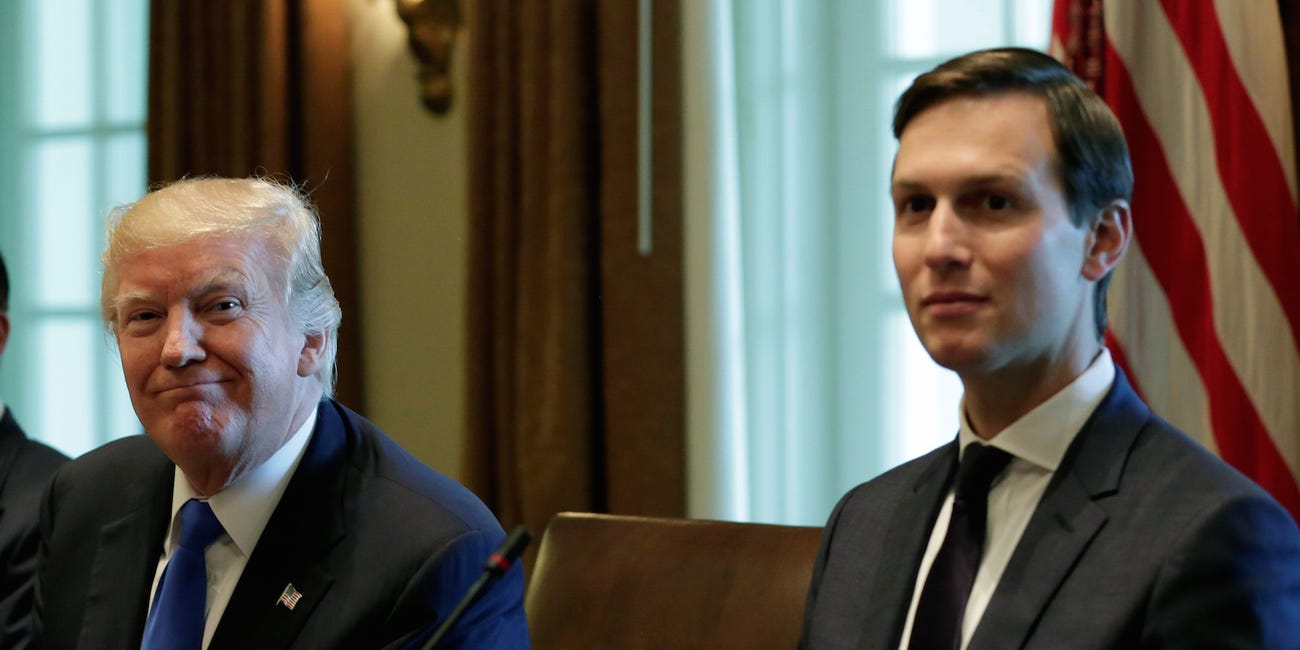
Our Nation Was Utterly Unprepared for This
Greg Sargent discusses some of the same overlapping trends I wrote about yesterday. For example, yesterday I said that you look at the map of where people have been doing the least sheltering in place, it looks remarkably like the map of where Medicaid hasn’t been expanded.
Americans have widely obeyed guidance to stay home to stop the spread of coronavirus. But not equally.https://t.co/F8oMVvXWBU
— Lauren Leatherby (@LaurenLeatherby) April 2, 2020
This map of the status of the Medicaid expansion, from @kff, looms large right now:https://t.co/U0r8Ss4hFd pic.twitter.com/fnIFw4f827
— Greg Sargent (@ThePlumLineGS) April 3, 2020
What’s coming is a kind of perfect storm, according to experts I spoke with: Soaring unemployment risks pushing huge numbers of people into the ranks of the uninsured. Many of those people will probably seek Medicaid coverage, further straining state budgets.
Add into that combustible mix a coming wave of coronavirus cases, and you have what health economist Austin Frakt described to me as a “looming catastrophe.”
This may be felt with great intensity in the south. That’s because in that region, there is a developing situation that could prove very distressing in coming weeks. On one hand, there hasn’t been enough social distancing in these places. On the other, many of those states have not opted into the Medicaid expansion, which could make the health care crisis far more acute.
A great many people right now are losing their jobs and thereby their health insurance. Most probably qualify for COBRA, but the bite with COBRA is that it is grossly expensive, and if you don’t have other income coming in you may not be able to afford it. However, I understand that people who have recently lost jobs have a grace period with which to purchase insurance in the ACA marketplaces, possibly qualifying for subsidies.
But if you didn’t have insurance to begin with, the national ACA marketplace is closed to you. And Trump won’t open it. “Numerous Democratic-leaning states that run their own insurance markets have already reopened enrollment in recent weeks as the coronavirus threat grew,” it says in Politico. The Trump administration oversees enrollment for about two-thirds of states.
(According to this page, the states that completely run their own insurance markets are Washington, Idaho, Nevada, California, Colorado, Minnesota, Vermont, Massachusetts, New York, Connecticut, Rhode Island, Maryland, and the District of Columbia. A few states — Oregon, New Mexico, Maine, Pennsylvania, Virginia, and New Jersey — may be transitioning to a state-based platform. Arkansas and Kentucky have state-based marketplaces on the federal platform which I suspect would stop them from opening the enrollment period now. Everyone else is completely at the mercy of Trump.)
Anyway, put together the soaring unemployment numbers, the huge percentage of the population without health insurance, and the strain on the medical care system, and you’ve got a catastrophe that won’t go away when the pandemic ends. It will be with us for quite a while. And it’s going to hit the south and big chunks of the midwest (see maps above) especially hard.
Back to Greg Sargent:
“What it means is a lot more hardship, health problems and death,” Frakt, the health economist, told me. Frakt noted that the virus is now likely to spread in those regions, which will dovetail in a terrible way with the failure to expand Medicaid.
“People who have lost their jobs and have nowhere else to turn,” if they can’t get on Medicaid, “they’ll have great difficulty affording the care they’ll need,” Frakt said.
Or, as Larry Levitt of the Kaiser Family Foundation bluntly put it, “poor people in states that haven’t expanded Medicaid” will have “no help.” And those ranks will swell. …
…Ominously, in some of these states, cases are mounting. As of now, Florida has over 9,000 confirmed cases; Georgia has nearly 5,500; Texas has nearly 5,000; Tennessee has nearly 3,000; and North Carolina has nearly 2,000.
And then there is the economic hit the nation is taking. Paul Krugman discusses it here, basically saying that it doesn’t necessarily have to be a long-range economic disaster except that the Trump Administration is in charge. So it probably will be.
Other Stuff to Read
Michelle Goldberg, Putting Jared Kushner In Charge Is Utter Madness
Paul Waldman, Trump’s ignorant son-in-law is running the coronavirus response. That’s unacceptable.
Paul Waldman, How this crisis could help us get to health-care reform
Charles Pierce, Robert Kraft Did a Good Thing. Now What Happens to Other States Without an NFL Team?
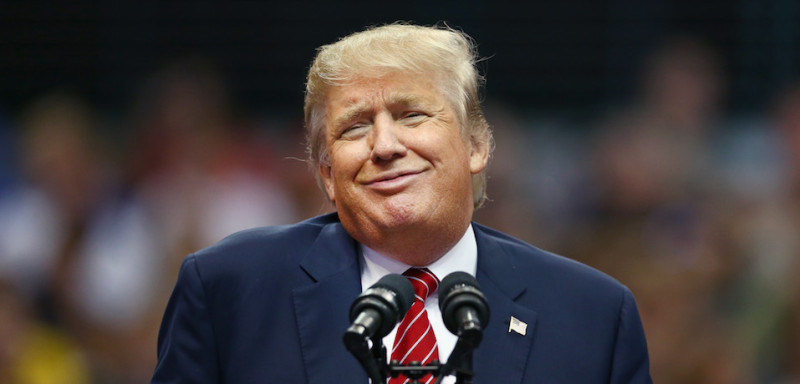
DALLAS, TX – SEPTEMBER 14: Republican presidential candidate Donald Trump speaks during a campaign rally at the American Airlines Center on September 14, 2015 in Dallas, Texas. More than 20,000 tickets have been distributed for the event. (Photo by Tom Pennington/Getty Images)
A Disaster for the Ages
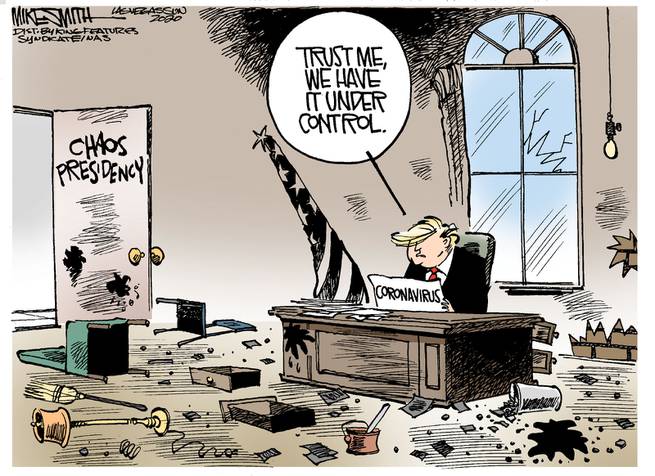
This crisis is going to get a lot worse before it gets better, I fear. And even as the effects of the pandemic fade in the rest of the world, they are going to be felt in the U.S. for a long, long time. And that’s because Donald Trump is president.
The Trump administration’s botched coronavirus response, explained by German Lopez at Vox does a good job walking us through all the ways the Trump Administration failed to respond to the pandemic when it would have made a difference. We’re past that point now. Even if the Trumpers get everything else right going forward, there will be tremendous misery, and lots of people will die who didn’t have to die. And the economy will be thoroughly bleeped for a long, long time.
“This will go down in history as profound failure of our national government,” Illinois Governor J.B. Pritzker said today. And the failure continues.
New York Governor Andrew Cuomo asked the federal government to put military logistics experts in charge of procuring and distributing medical supplies. Instead, right now pandemic response is being managed by Jared Kushner. I’m serious. Having already screwed up negotiating a bleeping contract with General Motors, Mr. Ivanka is now the nation’s ventilator czar.
What started two-and-a-half weeks ago as an effort to utilize the private sector to fix early testing failures has become an all-encompassing portfolio for Kushner, who, alongside a kitchen cabinet of outside experts including his former roommate and a suite of McKinsey consultants, has taken charge of the most important challenges facing the federal government: Expanding test access, ramping up industry production of needed medical supplies, and figuring out how to get those supplies to key locations.
Kushner has even obtained a new center of power at the Federal Emergency Management Agency, the crisis-response organization that’s taken over coronavirus strategy and planning — and where Kushner and his deputies ride herd on the health agencies that had been criticized for their slow responses to the pandemic earlier this year.
So we’re screwed. Jonathan Chait writes,
As head of an ad hoc task force, Kushner is “working alongside government officials from FEMA, HHS, and USAID to solve a range of logistical and technical challenges” and “has stepped in to coordinate decision-making at agencies including the Food and Drug Administration and the Centers for Medicare and Medicaid Services,” according to Politico. “I don’t know how our government operates anymore,” one Republican source complains.
For anybody familiar with Kushner’s boundless self-confidence in his ability to master even the thorniest of policy challenges, from modernizing government processes to solving the Israeli–Palestinian conflict, his disposition will come as no surprise. Gabriel Sherman reports that, in one meeting, the presidential son-in-law insisted that he had mastered the problem of ventilator disbursement. “I have all this data about ICU capacity. I’m doing my own projections, and I’ve gotten a lot smarter about this. New York doesn’t need all the ventilators,” Kushner announced, according to someone present.
A lot of people will die who didn’t have to die. See also an old Frank Bruni column from last November, Jared Kushner Fails Up Again.
And just when you might have through the derp couldn’t get any deeper, this happened today.
Georgia Gov. Brian Kemp said he wasn’t aware that asymptomatic people could transmit coronavirus as he announced he was preparing to issue a state-wide shelter-in-place order.
Let us take a moment for a mass facepalm.
It’s a good guess the pandemic is going to hit the southern states especially hard. See Where America Didn’t Stay Home Even as the Virus Spread. The concept of shelter in place was lost on the Deep South until maybe yesterday. See also The Coronavirus’s Unique Threat to the South in The Atlantic. For some reason, mortality rates from coronavirus among middle-aged and younger people are much higher in the South than elsewhere.
Although the majority of coronavirus-related deaths in Louisiana are still among victims over 70 years old, 43 percent of all reported deaths have been people under 70. In Georgia, people under 70 make up 49 percent of reported deaths. By comparison, people under 70 account for only 20 percent of deaths in Colorado. “Under 70” is a broad category, not really useful for understanding what’s going on. But digging deeper reveals more concerning numbers. In Louisiana, people from the ages of 40 to 59 account for 22 percent of all deaths. The same age range in Georgia accounts for 17 percent of all deaths. By comparison, the same age group accounts for only about 10 percent of all deaths in Colorado, and 6 percent of all deaths in Washington State. These statistics suggest that middle-aged and working-age adults in the two southern states are at much greater risk than their counterparts elsewhere; for some reason, they are more likely to die from COVID-19. … Case-fatality rates around the world are notoriously tricky because they are based in part on the extent of testing, but a recent study of the outbreak in Wuhan, China, found a case-fatality rate of 0.5 percent among adults from the ages of 30 to 59. The current estimate of fatality rates in the same age range in Louisiana is about four times that.
The article provides data showing that southerners are less healthy than the rest of us. They have higher rates of hypertension and heart disease at earlier ages. “Southerners are more likely to suffer from chronic diseases than other Americans—even as Americans are more likely to suffer from chronic disease than citizens of other countries with comparable wealth,” the article says. And a lot of that is because of poverty. And there’s this — the gray states hadn’t expanded Medicaid as of 2019.
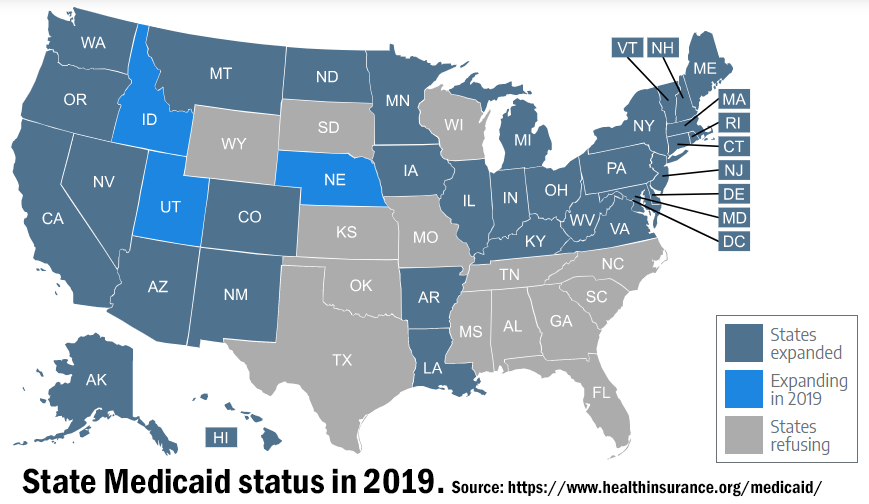
If you look at the New York Times map of where people have traveled the most over the past couple of months and then the Medicaid map, you see a close correlation. It’s not a perfect correlation, but close. That probably says something.
And then there’s the economic fallout. There’s an interview of Paul Krugman in Business Insider that’s useful. Among other things, he says that our government so far has produced the weakest economic response of all the G7 countries. And because the states are breaking their budgets to buy gray-market medical supplies now — not to mention losing tax revenue — there is likely to be a mass layoff of state employees next year, which will hurt the economy massively.
So this is not going to end soon, and it probably will haunt the country for a long time. And it didn’t have to be this bad.
Grifts in the Time of Pandemics
The Congresswoman is pissed.
Trump, you incompetent idiot! You sent 18 tons of PPE to China early but ignored warnings & called COVID19 concerns a hoax. You’ve endangered doctors, nurses, aids, orderlies, & janitors – all risking their lives to save ours. Pray 4 forgiveness for the harm that you’re causing!
— Maxine Waters (@RepMaxineWaters) March 30, 2020
Yes, Trump sent 17.8 tons of medical supplies to China early in 2020.
I foresee investigations to come. But with the Trumpers, it’s hard to know where the grift ends and sheer incompetence begins. This is from Politico, yesterday:
Last week, a Trump administration official working to secure much-needed protective gear for doctors and nurses in the United States had a startling encounter with counterparts in Thailand.
The official asked the Thais for help—only to be informed by the puzzled voices on the other side of the line that a U.S. shipment of the same supplies, the second of two so far, was already on its way to Bangkok.
The official then went to Mike Pence, who didn’t know about the assistance to Thailand, either. The shipments of supplies to other countries were initiated by the United States Agency for International Development (USAID), an independent government agency with a budget of over $27 billion. It is part of our government’s foreign policy apparatus and is supposed to be overseen by the State Department. The USAID website brags about the assistance U.S. taxpayers are providing to help other countries fight the pandemic. And, really, we should be helping other countries fight the pandemic; this needs to be an internationally coordinated effort and not every country for itself.
But I’m not seeing any coordinating going on. It’s just chaos.
There’s currently a hold on USAID shipments as Trumpers try to figure out what’s going on. Back to Politico:
President Donald Trump seems attuned to the political hazards. During Monday’s task force briefing, he emphasized that the U.S. was sending only “things that we don’t need” to other countries. “We’re going to be sending approximately $100 million worth of things – of surgical and medical and hospital things to Italy,” he announced.
The Politico reporting suggests that the “medical things” really are things we need here, though.
“The problem is, there’s not one person who’s in charge of this, which is why we’re instituting a review process that is led by the White House coronavirus task force,” a person directly involved with the review said.
Officials close to USAID say the ongoing review is more akin to a hold, as the task force examines the aid agency’s procurement of supplies and asks aid officials to alert them if there are other such shipments in the works.
But then if you keep reading the Politico article, it turns out that the State Department knew all about it.
America’s diplomats are also grappling with China’s attempts to exploit the shortages by supplying aid to Western countries, keenly aware of Beijing’s interest in showing it is supplanting the United States as a global leader.
Just days before a load of medical supplies from China arrived in the U.S. for distribution in New York, New Jersey and Connecticut, the State Department boasted in a press release that the United States was “Leading the Humanitarian and Health Assistance Response to COVID-19.”
Secretary of State Mike Pompeo highlighted the aid in a press conference on Tuesday, noting, “We’ve now made available a total of $274 million in funding to as many as 64 countries,” money he said “would go to some of the world’s most at-risk peoples.”
In the last two months, at least five U.S. embassies, including in Myanmar, Tajikistan, Uzbekistan, Kyrgyzstan and Laos, all announced in press releases that the U.S. government had given protective gear to their host countries, sometimes including pictures of boxes of the donations.
So at least some Trumpers did know that these much-needed resources were going overseas, and mostly this was being done so that China couldn’t make us look bad.
It’s crazy out there. There are reports a company in Texas is sitting on 2 million N95 masks and is ready to sell them — at six times the normal price. Meanwhile, medical personnel around the country are reporting that they are risking their lives caring for coronavirus patients without enough personal protection equipment. Hospitals are threatening to fire these same people if they keep talking to reporters. Vox reports that a huge gray market in medical supplies has emerged as all sorts of random people — some hoping to do good, some hoping to make a quick buck — jump into the medical supplies business.
Gee, wouldn’t it be nice if there was a single entity coordinating all this stuff? Like, you know, a government?
And this takes us to Charles Pierce and his must-read All the President*’s Excuses for Not Using the Defense Production Act Were Absolute Moonshine. Pierce begins by pointing to a New York Times report saying that the dreaded Defense Production Act is used all the time.
Chemicals used to construct military missiles. Materials needed to build drones. Body armor for agents patrolling the southwest border. Equipment for natural disaster response.
A Korean War-era law called the Defense Production Act has been used to place hundreds of thousands of orders by President Trump and his administration to ensure the procurement of vital equipment, according to reports submitted to Congress and interviews with former government officials.
Yet as governors and members of Congress plead with the president to use the law to force the production of ventilators and other medical equipment to combat the coronavirus pandemic, he has for weeks treated it like a “break the glass” last resort, to be invoked only when all else fails.
“You know, we’re a country not based on nationalizing our business,” Mr. Trump said earlier this month. “Call a person over in Venezuela, ask them how did nationalization of their businesses work out? Not too well.”
To which Charles Pierce responds,
Therefore, all the excuses that the president* has used for not using the DPA more widely in response to this pandemic, and in response to desperate pleas from the country’s governors, are absolute moonshine. He prefers the way things are working now. He wants governors to compete against FEMA, lose, and then have to beg for ventilators and PPE, which he can dole out like pork-barrel projects to help his re-election campaign.
Yep, one suspects that’s exactly the scam he’s planning. Because Trump doesn’t know how to do anything else.
See also:
Desperate lawmakers hunt for medical supplies as Trump takes hands-off approach, posted today in Politico.
History’s verdict on Trump will be devastating by Michael D’Antonio at CNN.
Greg Sargent, A White House report blows up Trump’s latest coronavirus defense

The Excuses Begin
The main excuses shaping up to explain away Trump’s abysmal response to the pandemic are twofold.
First is the Condoleeze Rice defense — no one could have predicted this. This one has been underway for a while. Aaron Blake wrote on March 19:
“So there’s never been anything like this in history. There’s never been,” he said. “And nobody’s ever seen anything like this.”
He added Wednesday: “Nobody ever saw numbers like this even with regard to testing.”
“I just think this is something … that you can never really think is going to happen,” he said March 6.
“It’s an unforeseen problem,” he added the same day. “What a problem. Came out of nowhere.”
See also Greg Sargent, Kellyanne Conway’s ugly deceptions preview the Big Lie to come.
First, this pandemic is hardly unprecedented. There was a big, honking precedent in 1918-1920 that killed Trump’s grandfather. The so-called “Spanish flu” infected a third of the world’s population and is estimated to have killed 50 million people. That’s some precedent right there. More recently another coronavirus, SARS-CoV-1 (our Covid 19 is officially SARS-CoV-2), also was designated a pandemic in 2003, although it was far better contained through coordinated international effort. Our Center for Disease Control was a critical part of that effort. Obviously, that was before Trump gutted the agency and put some ass-kissing wingnut in charge of it.
And Trump was given plenty of warnings. I am grateful to John Haltiwanger and Sonam Sheth of Business Insider, who compiled all the warnings in Trump says ‘nobody’ could’ve predicted a pandemic like coronavirus. Here are all the times he was warned about it and refused to take action. This one’s a clip ‘n’ save, folks. Bookmark it and be prepared to trot it out whenver you encounter a wingnut claiming no one could have anticipated the pandemic.
The other excuse is that Trump was distracted by the Democrats’ impeachment effort. Trump was acquitted on February 5th, so what’s his excuse after that? But here he is on January 22, in Davos, a few hours after the first case in the U.S. had been diagnosed. (You only need to watch the first minute or so.)
He doesn’t seem that distracted to me. Just clueless. This video is the source of the quote:
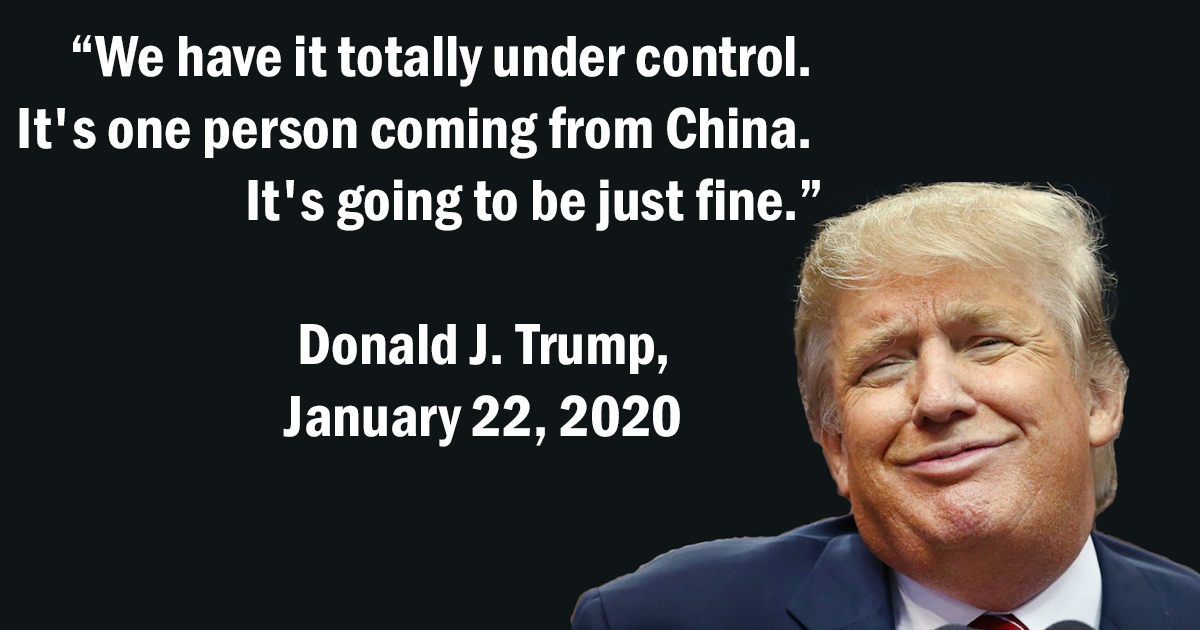
Love that quote.
One other point Trump makes sometimes is that he inherited a “mess” and a “broken system” when he became POTUS. In other words, blame Obama. But the truth is that Trump inhereted a world-class pandemic fighting system from the Obama Administration — and dismantled it. See How America built the best pandemic response system in history – and threw it away by Will Dunn in New Statesman (h/t moonbat). From the article blurb: “The Trump administration destroyed an infrastructure, built over two decades, that may have been humanity’s most powerful weapon against new diseases.”
No country, least of all a vast land mass with 149 international airports, can ever be fully prepared for a pandemic – but in 2016, the US was, domestically and internationally, more prepared than it had ever been.
And then Trump became POTUS, and IMO it’s not going too far to say that he dismantled the entire pandemic-response infrastructure he inherited from Obama. What little was left of it was too gutted to be of much use. If the system is broken, it was Trump who broke it.
See also Paul Krugman, This Land of Denial and Death.
Update: See also Republicans say impeachment distracted Trump from coronavirus. But the president golfed and held rallies during his trial while downplaying the virus for weeks in Business Insider.
The Virus vs. Our Ruling Fatuous Asses
I’ve argued for a while that the U.S. is being run by a class of decadent, inbred aristocrats. I wrote back in 2007 about Bush policies in Iraq —
But after all that’s happened (and gone wrong), the unflappable hubris of the Bush Administration continues to amaze me. They remind me of Old World aristocrats — the ones in movies, anyway — inbred, vain, spoiled, and privileged. Movie aristocrats are arrogant fops who get shown up by the plain spoken American hero, who (unlike the fops) is skilled and experienced and smart. Now I wonder how many Bush Administration officials it takes to screw in a light bulb. Oh, wait, they have maids for that. Never mind.
See also Our Decadent Aristocracy, written a year ago.
Now here is another exhibit for the “this must be how democracies end” file. Some colossally fatuous ass named Richard Epstein wrote an analysis for the Hoover Institution “think tank” that argued everybody is overreacting to the pandemic and should just stop being hysterical. Oh, and social distancing is silly.
Now, Epstein is not just any colossally fatuous ass. He’s made a lucrative career of it. This is from Wikipedia:
Epstein is currently the Laurence A. Tisch Professor of Law and director of the Classical Liberal Institute at New York University, the Peter and Kirsten Bedford Senior Fellow at the Hoover Institution, and the James Parker Hall Distinguished Service Professor of Law emeritus and a senior lecturer at the University of Chicago. In March 2020, Epstein influenced the Trump administration’s response to the coronavirus pandemic with his writings where he attacked measures to enforce social distancing, claimed the Coronavirus was not a “pandemic,” and predicted there would ultimately be 500 American deaths.[1][2][3]
Epstein’s writings have extensively influenced American legal thought. In 2000, a study published in The Journal of Legal Studies identified Epstein as the 12th-most cited legal scholar of the 20th century. In 2008, he was chosen in a poll taken by Legal Affairs as one of the most influential legal thinkers of modern times. A study of legal publications between 2009 and 2013 found Epstein to be the 3rd-most frequently cited American legal scholar during that period, behind only Cass Sunstein and Erwin Chemerinsky. He has been a member of the American Academy of Arts and Sciences since 1985.
You may think I’m being hard on Epstein. But I give you this interview with Epstein, The Contrarian Coronavirus Theory That Informed the Trump Administration by Isaac Chotiner in the New Yorker, in which Chotiner brilliantly allowed Epstein to display his fatuous assholery in all his ghastly glory. I’m not going to quote it; you really have to read the whole thing. It is jaw-dropping. The man has no clue what he is talking about and is clearly too stupid to realize he has no clue what he is talking about. Calling him a mere fatuous ass is being kind. But there he is, a fatuous ass who somehow is considered smart and scholarly and is paid a lot of money for it.
The ever-brilliant Andrew O’Hehir nailed Epstein’s ass in Salon:
Let us note that Epstein has zero expertise in science or medicine, and also that he belongs to the lard-ass “conservative intellectual” caste for whom pronouncing something “contrarian” always carries a sort of erotic thrill and always means that one is boosting the cause of so-called free-market capitalism, and arguing that anything government could possibly do is destructive (except to poison itself and die).
One gets the impression that the cognitively challenged Epstein has made a lucrative career out of telling the worshippers of “free market” capitalism what they wanted to hear.
Corrections and math errors aside, Richard Epstein did his duty to the overlord class that employs him. For a hot minute there, he slapped a seemingly dispassionate intellectual gloss on the notion that all this was a giant overreaction, and some new bug that might carry off a few less-than-productive grandmas was no reason to shut down the malls and the office parks and the call centers.
It appears that Epstein’s work of contrarian genius circulated rapidly — one could almost say virally — among the captains of Big Capital. I think it’s fair to say they were (and are) collectively shit-scared by the plunging stock market, the spiking unemployment numbers and, most of all, by the hypothetical possibility of losing their financial and ideological hegemony over the vast, rigged shell game of the global economy.
The old, inbred, decadent aristocracies that held absolute power in feudal times needed courtiers who catered to their greed and egos, and today’s aristocrats are no different. The key to success in America today isn’t hard work, talent, smarts, or good grades. It’s money and connections. And if you weren’t born into the aristocracy, you can become a member in good standing by providing pseudo-intellectual / propaganda support services to help the privileged and inbred stay in power — in other words, by telling the ruling overlords what they want to hear. Thus Richard Epstein.
Note that Epstein also is the author of a book that argues health care should not be a universal right. Here is the Amazon blurb:
Most Americans assume that universal access to health care is a desirable and humane political goal. Not so, says distinguished legal scholar Richard Epstein. In this seminal work, he explodes the unspoken assumption that a government-administered, universal health-care system would be a boon to America. Basing his argument in our common law traditions that limit the collective responsibility for an individual’s welfare, he provides a political and economic analysis which suggests that unregulated provision of health care will, in the long run, guarantee greater access to quality medical care for more people.
At this point it’s obvious to anyone living in the Real World that “unregulated provision of health care” in some completely free-market system will mean that only the very wealthy will have access to 21st-centiury medical care. The rest of us will make do with quacks and witch doctors.
Now that the coronavirus has so publicly pantsed Epstein, one would think his career would be over. But it won’t. In today’s America you can be such a completely fatuous ass that you can barely tie your own shoes and still get paid for your opinion. See, for example, Mark Penn.
Even so, history shows us that aristocracies tend to be self-limiting. Eventually, after generations of insulation and inbreeding, there are no candidates for the throne who aren’t hopelessly dimwitted and demented, and then comes the coup or the revolution and the cycle begins again. The frailties and insulations of our aristocracy — both parties — gave us the ultimate in dimwitted and demented rulers, Donald J. Trump. I question whether there will be a coup or revolution, however, because there is just too much damn money invested in the old order. Our situation may have to get even worse before the chains can be broken. And they need to be broken.
Jet Heer writes of Richard Epstein,
Although Epstein is a crackpot, he’s a crackpot who has a far-reaching influence thanks to the right-wing legal network that has nurtured his entire career. His absurd article on the coronavirus is not just a personal scandal or a blot on his record, but also evidence of wider social and political corruption.
Epstein has been allowed to flourish thanks to a host of institutions, including the Federalist Society, the University of Chicago, New York University, and the Hoover Institution. All of them are tarnished by his ridiculous coronavirus article.
The pandemic has made Epstein more famous, but his ideas have been circulating in elite legal and political circles for decades. As such, his influence on the current moment is deeper than just a few articles read in the Trump White House. As author Matt Stoller tweeted, “In case you’re wondering why we can’t handle the #coronavirus as a society it’s because Richard Epstein types have been designing our corporate and government bureaucracies for four decades.” In other words, Epstein’s delusional views on the coronavirus resonate in the Trump White House because Republicans have been acting on Epstein’s ideas for decades.
These are, of course, the same people who fight us on global climate change, health care, income inequality, and every other issue you can think of. IMO the nation can’t survive their influence much longer.
Update: See also Paul Campos, A Plague of Libertarians

It’s Everywhere, It’s Everywhere …
So far, the pandemic has hit big cities/blue states a lot harder than rural areas/red states. But that’s likely to change. Nate Silver wrote a couple of days ago,
Overall, although the number of detected cases is higher in blue states, the number is increasing at a more rapid rate in red states.1 Moreover, blue states have conducted more tests per capita than red states, so — given that the large majority of coronavirus cases remain undetected — the lower rate of cases in red states may partially be an artifact of less testing.
It already has changed, actually. New York City is being slammed, but if you remove New York, the distribution between red and blue states looks a lot more even.
About three-quarters of the confirmed cases in the United States are in states that voted for Hillary Clinton in 2016, according to data compiled by Johns Hopkins University. About half are in New York alone. …
… If we take New York out of the mix, the distribution of confirmed cases still indicates that blue states, which often are more heavily urban and populous, have the most cases. But this also reveals there are a number of states that preferred Trump in 2016 and now have a significant number of cases. …
… New York has more cases in part because it’s got more people. If we control for population, showing the number of confirmed cases per 100,000 residents in a state, other problem areas emerge. The District of Columbia, for example, has the fifth-most cases as a function of population. Louisiana has more cases as a function of population than any other red state, by a wide margin. …
… What’s important is that the number of cases has increased significantly across the board. In states that voted for Clinton in 2016, which make up three-quarters of known cases, the number of new confirmed cases from March 17 to March 24 increased by an average of 530 percent.
In red states, the average increase was 860 percent.
It’s now widely believed the rapid spread of the virus in Louisiana began with the big crowds in New Orleans for Mardi Gras, February 25.
And then there’s Florida, whose utterly worthless governor refused to close beaches for spring break and who still hasn’t issued shelter-in-place orders for his state. Instead, Gov. DeSantis has become obsessed with keeping New Yorkers and other “foreigners” out of Florida. It appears DeSantis was the one who put the idea of putting all of New York under quarantine into Trump’s head. Trump was talked out of it last night some time. See also Florida begins coronavirus checkpoints, threatens jail time for out-of-state travelers who don’t self-quarantine.
In truth, there’s no question that the virus is spreading freely within Florida and is past the point of containment. “The number of confirmed coronavirus cases in Florida is doubling every three days,” it says here. It’s way too late to keep the virus out. In a couple of months, Floridians may be trying to escape to New York.
As the pandemic spreads into rural areas, another big weakness in our sorry-ass health care system will soon come into view — the shortage of rural hospitals. More than half the counties in America have no intensive care beds, it says here.
Even in heavily impacted blue states, though, there is a significant partisan difference in how people understand the crisis, with Democrats taking it more seriously than Republicans. “Republicans consistently report less concern about the virus and that they’re taking fewer actions meant to slow the virus’s spread,” writes Philip Bump at WaPo. We’ll see if that attitude persists when the pandemic gets personal. Right now, it’s still an abstraction.
At Rolling Stone, Sean Woods says that the coronavirus pandemic can be compared to a fast-motion climate crisis.
Warnings about the crisis went unheeded. Scientists were ignored and called doomsayers. The press accounts were labeled fake news and brushed aside. “The cure would be worse than the illness” went the argument. Government watchdogs saw their budgets gutted. Lawmakers misled the country and did more harm then good. We were told by leaders that “everything was under control” or that the worry was nothing more than “a hoax.” …
…The mishandling of the coronavirus has terrifying parallels to the climate crisis. It’s difficult to think about the other civilizational calamity on our doorstep. It’s much easier to be consumed by what’s happening right now, or better yet to hunker down and binge watch your favorite shows and hope the plague passes over. But we cannot. Both tests call for innovation and a collective response. During the pandemic, we have witnessed failures of leadership but also incredible bravery, resolve, sacrifice, and innovation. That is the blueprint for our future. …
… In the face of the coronavirus and the climate crisis, any ideology that worships profit above all else, that trumpets individualism above the common good every single time, is simply a roadmap to self-immolation. As Congresswoman Alexandria Ocasio-Cortez told Rolling Stone’s Tessa Stuart, “It’s not just about the science — it’s about the systems that protect all of the power that goes into defying the science.”
I’m reading that in places like New York, the peak probably will hit about mid-April. In rural areas, it will be later. And it is possible — no one really knows — that the spread of the virus will slow as the weather warms up. But even if that’s so, it will be back in the fall. There won’t be any escaping it.
